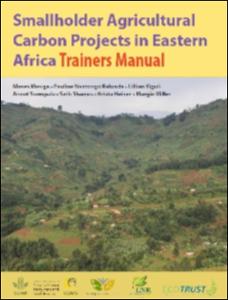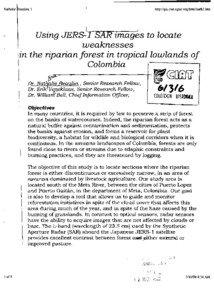Riesgos y oportunidades: Una introducción a la gobernanza forestal, las comunidades y REDD+ en América Latina
REDD+ es un mecanismo financiero con un potencial significativo para cambiar los incentivos conducentes a la deforestación y el cambio de uso de la tierra, con efectos en la conservación del bosque y la sostenibilidad. REDD+ no es en sí mismo una reforma de la gobernanza, pero afectará a la gobernanza forestal o será afectado por ella. REDD+ puede mejorar la gobernanza forestal o ser minado por sus imperfecciones, ya que depende de una buena gobernanza forestal para ser eficiente, efectivo y equitativo.
Smallholder Agricultural Carbon Projects in Eastern Africa
This manual has been developed to help build the capacities of farmers, farmers groups, extension staff and project managers who are implementing agricultural carbon projects in Eastern Africa. The manual describes the steps for implementing an afforestation/reforestation voluntary carbon project based on the Plan Vivo Standard.
Sustaining Agriculture through Climate Change (SACC): CARE International
Case study for the report "Institutional innovations in African smallholder carbon projects" available at http://hdl.handle.net/10568/21222
Unravelling the mysteries of the Quesungal Agroforestry System
Use of deep-rooted tropical pastures to build-up an arable layer throught improvement soil properties of an oxisol in the Eastern Plains (Llanos Orientales) of Colombia
It is widely believed that tropical soils (mainly Oxisols) have excellent physical characteristics such as high infiltration rates, high permeability of water, good and stable soil structure and that consequently, they can support mechanized agriculture. However in the Eastern Plains (Llanos Orientales) of Colombia, when Oxisols are subjected to tillage using disc harrow, soil physical conditions deteriorate rapidly.
Using JERS-1 SAR images to locate weaknesses in the riparian forest in tropical lowlands of Colombia
Biomass productivity-based mapping of global land degradation hotspots
Economics of land degradation in Niger
Land degradation poses daunting challenges to Niger and the country has designed several policies and strategies for combatting it. Building on work past studies, this study uses new satellite data which have higher resolution and run for longer time – thus capturing the longterm land management dynamics. This study also uses an improved cost of land degradation model which nets out benefits from land improvement as well analysing the impacts of land degradation on food and nutrition security.
LEGEND Land Policy Bulletin 12
This bulletin distils lessons from a sugarcane cooperative in Malawi and a forestry investment scheme in Sierra Leone, drawing on the five pillars of inclusive business as identified in the 2018 LEGEND state of the debate report.
Better Land Husbandry: Re-thinking approaches to land improvement and the conservation of water and soil
Soil erosion has conventionally been perceived as the chief cause of land degradation, yet the limited effectiveness and poor uptake of widely promoted physical and biological anti-erosion methods challenges this logic. An alternative perception focusing on prior land damage - notably to soil cover, architecture and fertility - permits an holistic, farmer-centred approach which has generated positive response to date.
Myths in Land Degeradation and Development
Water erosion is the most important degradation process of the 10 degradation processes distinguished by the European Union. The impact of rain drops on the soil surface causes splash of soil particles








